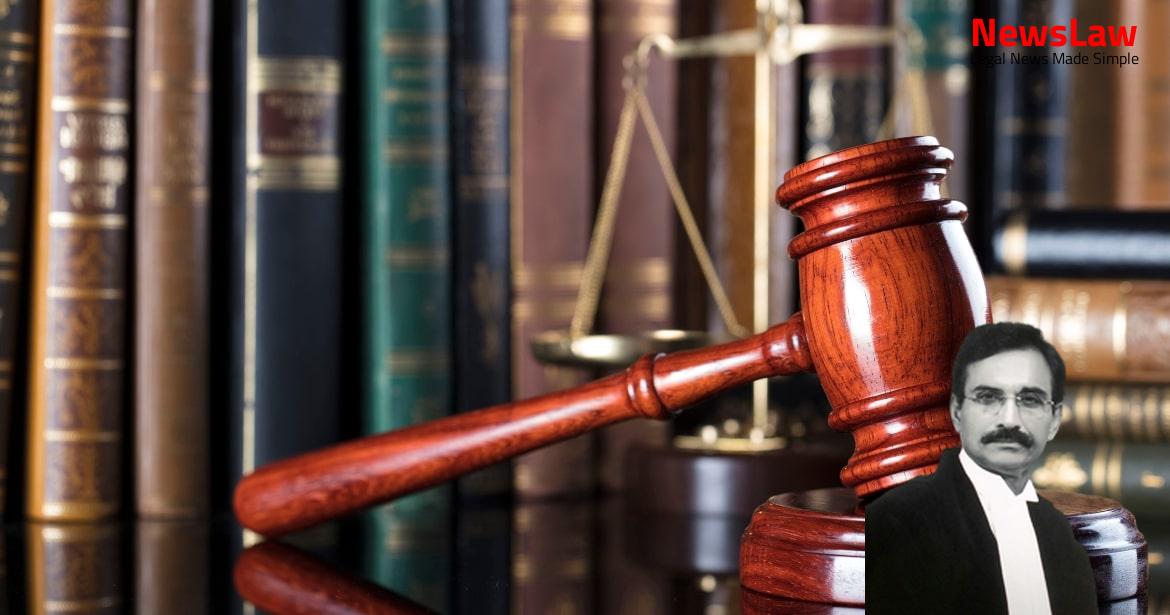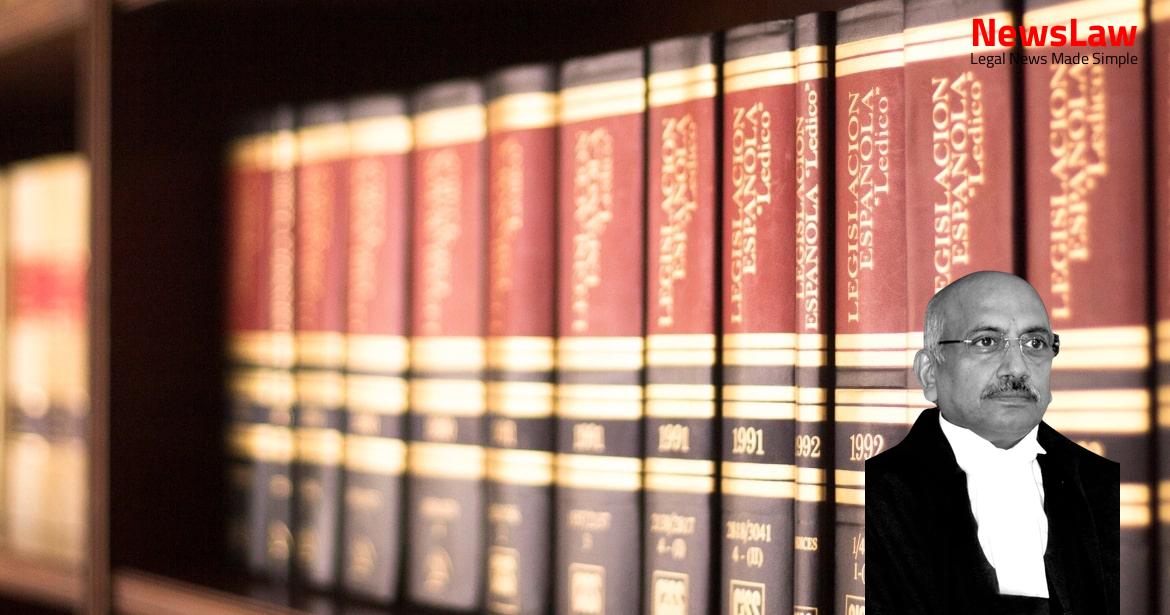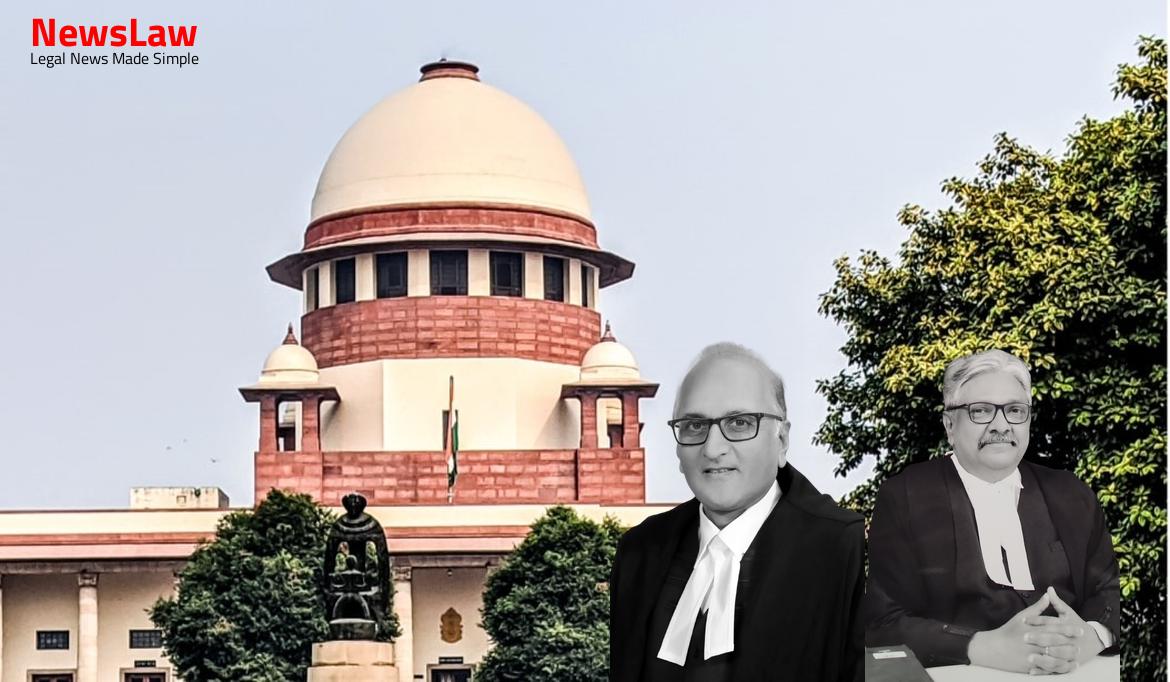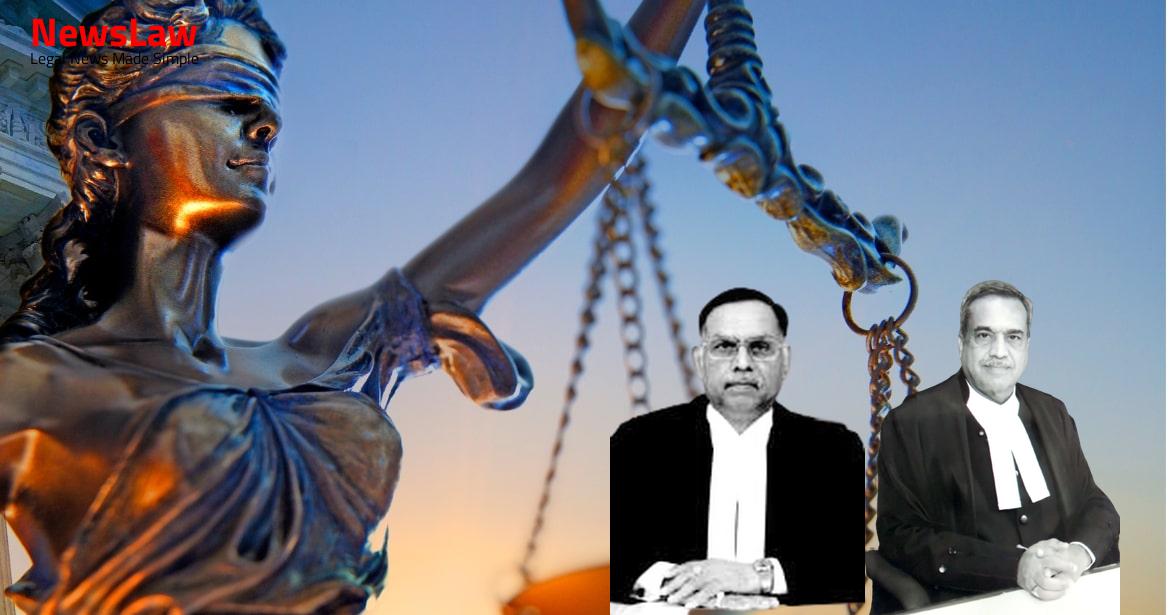Explore a detailed legal analysis by the court regarding a case involving a claim for damages in the context of a collaboration agreement termination. The court’s thorough examination of the relevant laws and provisions sheds light on the complexities of determining the validity of a damages claim in such scenarios. Dive into the nuances of contract law and compensation through the lens of the court’s meticulous legal analysis.
Facts
- The Appellant filed Civil Suit No.214 of 2004 seeking various reliefs related to a collaboration agreement dated 01.11.1994.
- The reliefs sought included perpetual injunctions, declarations, and specific performance of the agreement.
- The High Court granted an interim injunction restraining the Respondents from terminating the agreement and interfering with the Appellant’s use of ‘Aral’.
- The interim order was initially extended but later vacated by the Single Judge. A stay was granted temporarily.
- An appeal against the Single Judge’s order led to a Division Bench continuing the interim order and eventually dismissing the Appellant’s appeal.
- Respondent No.3 also filed an appeal against the judgment regarding the perpetual injunction granted to the Appellant.
- The Collaboration Agreement between the Appellant and Respondent No.3 required the manufacture and marketing of lubricants in India.
- Approval from the Government was obtained for royalty and contract duration extension, becoming part of the Agreement via a Supplementary Agreement.
- A termination notice was issued by Respondent No.3 in 2004, leading to legal disputes and court interventions.
- The Appellant was given an exclusive license under the Collaboration Agreement for distribution and marketing of Aral lubricants in India.
- Various approvals were obtained, including from the Reserve Bank of India, to fulfill the terms of the Collaboration Agreement.
- Changes in ownership due to acquisitions by BP Plc. affected the parties involved in the Collaboration Agreement.
- Respondent No.3 was not entitled to terminate the agreement before 31.12.2009
- Termination letter issued on 14.04.2004 was in violation of agreed terms
- Defendants were not guilty of conspiracy or procuring breach of contract
- Termination was predominantly economic with collateral damage to the Appellant
- No intention to specifically injure the Appellants
- Specific performance relief denied due to future unspecified obligations in the contract
- Decree of injunction passed against Respondent No.3 and its affiliates till 31.12.2009
- Division Bench upheld the judgment of the Single Judge in all counts
Also Read: Reversal of High Court’s Decision on Auction Sale Confirmation
Issue
- Is the suit maintainable?
- Does this Court have jurisdiction to try and determine this suit?
- Applicable law for construing the collaboration agreement dated 1st November 1994 – German law or Indian law?
- What would be the duration of the contract considering the approval given by Reserve Bank of India?
- Termination of the Agreement dated 1st November 2004 – terminable by six months’ notice or valid till 31st December 2009?
- Validity of the letter of termination as alleged in paragraph 44 of the plaint.
- Alleged conspiracy between defendant Nos. 1 and 2 for procuring breach and termination of the contract between defendant No. 3 and the plaintiff.
- Entitlement of the plaintiff to exclusive right of use of the brand ‘Aral’ in India.
- Plaintiff’s right to sell lubricants under the brand name ‘Aral’ with ‘Aral’ design in India.
- Reliefs, if any, that the plaintiff is entitled to.
Also Read: Interest Compensation Dispute in Property Demolition Case
Arguments
- The Appellant, represented by Mr. Dwivedi, sought damages for the period from 24.08.2005 till 31.12.2009 due to the expiration of the Collaboration Agreement.
- Mr. Dwivedi argued that the Appellant is entitled to damages even if it was not specifically claimed in the suit or appeal, citing relevant judgments and provisions of the Specific Relief Act and Indian Contract Act.
- He referenced a letter from the Finance Director of Castrol India Limited to support the claim for compensation based on the profit margins of Respondent No. 3.
- Ms. Debolina Roy, representing the Respondent, countered the argument by stating that the cited judgments were not applicable to the case as they pertained to compensation under the Land Acquisition Act.
- The dispute revolved around the expiry date of the Collaboration Agreement, with the Plaintiff claiming extension till 31.12.2009 based on a Supplementary Agreement, while the Respondents argued for a termination in December 2004 with RBI approval until 31.12.2009 only for royalty remittance.
- Respondent contends that damages can only be granted for the loss suffered and not for the loss of profits as per Section 73 of the Indian Contract Act.
- Approval granted by the Reserve Bank of India and the Government of India related only to the payment of royalty and did not impinge on the power of parties to terminate the Agreement as per Clause 5 of the Collaboration Agreement.
- Clause 5 of the Collaboration Agreement stipulates that either party could terminate the agreement by giving a notice six months prior, after the expiry of the initial three years of the term.
- Appellant failed to plead relief for damages at any stage in the Civil Court, High Court, or before the current court.
- Even if the Collaboration Agreement expired on 31.12.2009, the Appellant did not raise this ground or seek to amend the relief during the 13-year pendency of this appeal.
- Emails dated 03.07.2003 and 07.04.2004 referred to by the Appellant are deemed unreliable for estimating compensation/damages.
Also Read: Legal Interpretation of Extension of Judicial Member’s Term
Analysis
- The Appellant contended that specific performance of the contract became impossible due to compulsory acquisition proceedings initiated during the appeal.
- No relief in the form of damages or compensation was sought by the Appellant due to difficulty in quantifying prospective losses.
- Section 21(5) of the Specific Relief Act was cited by the Appellant to support their claim for damages instead of specific performance.
- The Court found that damages for the period in question were not entitled to the Appellant based on the evidence presented.
- The termination notice issued in accordance with Clause 5 resulted in the expiration of the Collaboration Agreement.
- No claim for compensation for breach of the agreement was made during the appeal process.
- The Appellant’s interest in specific performance of the Collaboration Agreement was evident until its expiration on 31.12.2009.
- The Supreme Court vacated the interim order in favor of the Appellant on 24.08.2005, post which no relief for damages was claimed.
- The judgment highlighted that no steps were taken to amend the appeal even after the agreement’s expiry.
- The discussion included the consideration of the Collaboration Agreement and Supplementary Agreements entered into by the parties.
- The High Court’s decision to set aside the termination notice was found to be supported by the terms agreed upon by the parties.
- There was no amendment sought for compensation in addition to or in substitution of the agreement in question.
- The Appellant acknowledged that no claims for damages or compensation were made in the initial suit.
- The court’s determination of the compensation under this section should follow the principles stated in section 73 of the Indian Contract Act, 1872.
- Compensation cannot be awarded under this section if it was not claimed by the plaintiff in the initial claim.
- If the court decides not to grant specific performance but finds that there was a contract that the defendant breached, the plaintiff is entitled to compensation for that breach which will be awarded accordingly.
- Court rejected the contention in Sukhbir v. Ajit Singh that compensation cannot be awarded under Section 21 without being claimed in the plaint
- Compensation was granted as an alternate decree in the absence of a specific claim in the original pleading in Shamsu Suhara Beevi v. G. Alex and Another
- High Court erred in granting compensation under Section 21 in addition to specific performance without a prayer for it in the plaint or at a later stage of the proceedings
- The court emphasized that relief granted must align with the provisions of the statute and that equity must yield to the law
- Amendment of relief was permitted in cases where the quantum of compensation is easily assessable by determination of market value
- In Urmila Devi & Ors. v. Deity, Mandir Shree Chamunda Devi, compensation was awarded in lieu of specific performance when the contract became impossible to perform
- Law Commission recommended that plaintiffs should be allowed to seek an amendment in the pleadings to include a prayer for compensation at any stage of the proceedings
- Claim for compensation in addition to specific performance considered in the case.
- Court did not grant the request for damages.
- No steps were taken by the Appellant for specific performance.
- The judgments cited by the Appellant were found not applicable to the case.
Decision
- Civil Appeal No 3128 of 2009 is dismissed
- The appellant pleaded for damages or compensation
- Civil Appeal No 3127 of 2009 is disposed of
- No relief can be granted to the Appellant
Case Title: UNIVERSAL PETRO CHEMICALS LTD. Vs. B.P.PLC AND OTHERS (2022 INSC 200)
Case Number: C.A. No.-003127-003127 / 2009



